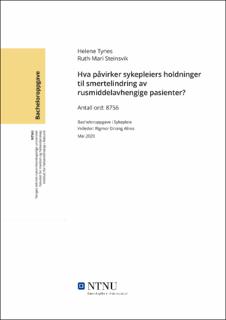| dc.contributor.advisor | Alnes, Rigmor Einang | |
| dc.contributor.author | Tynes, Helene | |
| dc.contributor.author | Steinsvik, Ruth-Mari | |
| dc.date.accessioned | 2020-07-19T16:03:25Z | |
| dc.date.available | 2020-07-19T16:03:25Z | |
| dc.date.issued | 2020 | |
| dc.identifier.uri | https://hdl.handle.net/11250/2669666 | |
| dc.description.abstract | Hensikt: Studien har som hensikt å undersøke hvilke faktorer som påvirker sykepleiers holdninger til å smertelindre pasienter som lider av en rusmiddelavhengighet. Sykepleiere fra spesialisthelsetjenesten er utgangspunktet for studien. Holdningene sykepleiere har til pasientgruppen vil også være sentralt for studien.
Metode: Studien er gjennomført som en systematisk litteraturstudie. Denne studien baserer seg på seks kvalitative og to kvantitative forskningsartikler.
Resultat: Det er flere faktorer som virker å ha betydning for sykepleiers holdninger. Faktorer som påvirker holdningene viser seg å være tillit/mistillit mellom sykepleier og pasient, sykepleiers kompetanse innen smertelindring, og erfaringer med pasientgruppen. Manglende støtte i rollen som sykepleier, kvalitetsarbeid og samspill mellom sykepleiere og andre profesjoner har betydning for sykepleiers holdninger. I løpet av analysen av artiklene blir det bekreftet at sykepleiere har både negative, nøytrale og positive holdninger til pasientgruppen.
Konklusjon: Sykepleiere har ikke nødvendigvis en negativ holdning til pasientgruppen eller smertelindringen. Forholdene rundt arbeidet med pasientene viser seg å ha mye å si for smertelindringen de får. De negative holdningene virker å være påvirket av manglende kunnskaper og støtte i rollen som sykepleier, samt mistillit mellom sykepleier og pasient. Å øke sykepleiers kompetanse, erfaring og etablering av tillit mellom pasient og sykepleier virker å skape positive holdninger. Ledere kan støtte sykepleiere ved å tilrettelegge for kvalitetsarbeid. Samspill med smerteteam har også skapt trygghet og nøytrale holdninger hos sykepleiere. | |
| dc.description.abstract | Aim: The study aims to investigate which factors that are involved in influencing nurse's attitudes to pain-relieving patients suffering from a drug addiction. Nurses from the specialist health service are the starting point for the study. The attitudes of nurses to the patient group will also be central to the study.
Methods: The study was conducted as a systematic literature study. This study is based on six qualitative and two quantitative research articles.
Findings: There are several factors that affect and influence nurses' attitudes. Factors affecting attitudes are found to be trust / mistrust between nurse and patient, nurse's knowledge in pain relief, and experiences with the patient group. Lack of support in the role as a nurse, quality work and interaction between nurses and other professions haves an importance in the nurses' attitudes. During the analysis of the articles, it has been confirmed that nurses have both negative, neutral and positive attitudes towards the patient group.
Conclusion: Nurses do not necessarily have a negative attitude towards the patient group or the pain relief. The conditions surrounding the work with the patients appear to affect the pain relief they receive. The negative attitudes appear to be influenced by a lack of knowledge and support in the role of a nurse, as well as mistrust between the nurse and the patient. Increasing the nurse's competence, experience and establishing trust between the patient and the nurse seems to create positive attitudes. Leaders can support nurses by facilitating quality work. Interaction with pain teams has also created safety and neutral attitudes in nurses. | |
| dc.publisher | NTNU | |
| dc.title | Hva påvirker sykepleiers holdninger til smertelindring av rusmiddelavhengige pasienter? | |
| dc.type | Bachelor thesis | |
